Kingston HyperX 3K (240GB) SSD Review
by Anand Lal Shimpi on April 10, 2012 3:00 AM ESTRandom Read/Write Speed
The four corners of SSD performance are as follows: random read, random write, sequential read and sequential write speed. Random accesses are generally small in size, while sequential accesses tend to be larger and thus we have the four Iometer tests we use in all of our reviews.
Our first test writes 4KB in a completely random pattern over an 8GB space of the drive to simulate the sort of random access that you'd see on an OS drive (even this is more stressful than a normal desktop user would see). I perform three concurrent IOs and run the test for 3 minutes. The results reported are in average MB/s over the entire time. We use both standard pseudo randomly generated data for each write as well as fully random data to show you both the maximum and minimum performance offered by SandForce based drives in these tests. The average performance of SF drives will likely be somewhere in between the two values for each drive you see in the graphs. For an understanding of why this matters, read our original SandForce article.
Many of you have asked for random write performance at higher queue depths. What I have below is our 4KB random write test performed at a queue depth of 32 instead of 3. While the vast majority of desktop usage models experience queue depths of 0 - 5, higher depths are possible in heavy I/O (and multi-user) workloads:
Sequential Read/Write Speed
To measure sequential performance I ran a 1 minute long 128KB sequential test over the entire span of the drive at a queue depth of 1. The results reported are in average MB/s over the entire test length.
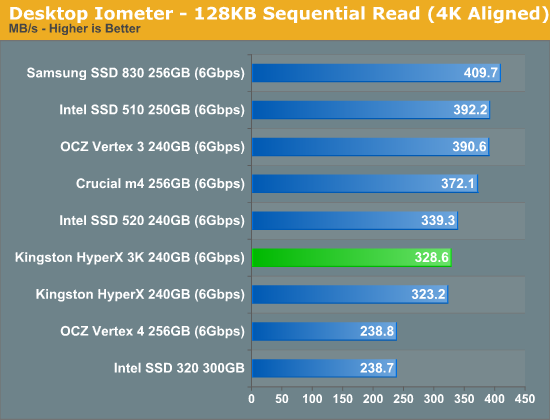
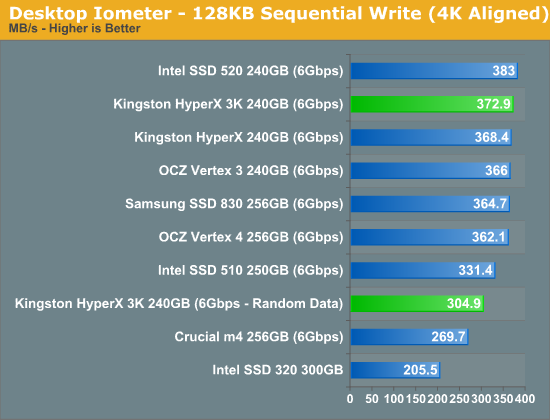
AS-SSD Incompressible Sequential Performance
The AS-SSD sequential benchmark uses incompressible data for all of its transfers. The result is a pretty big reduction in sequential write speed on SandForce based controllers.
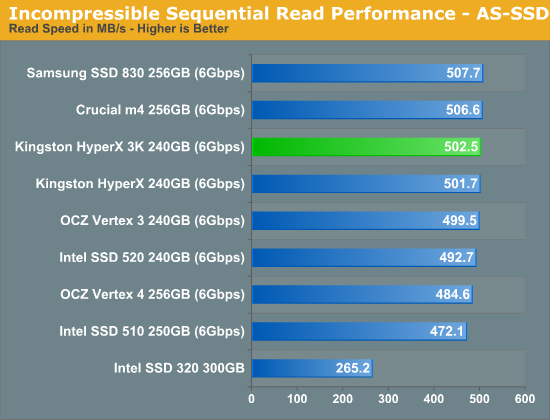
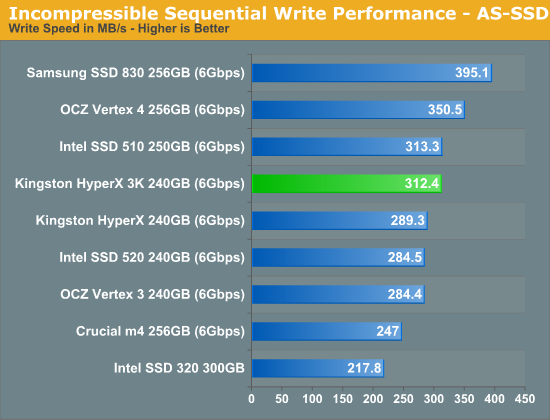


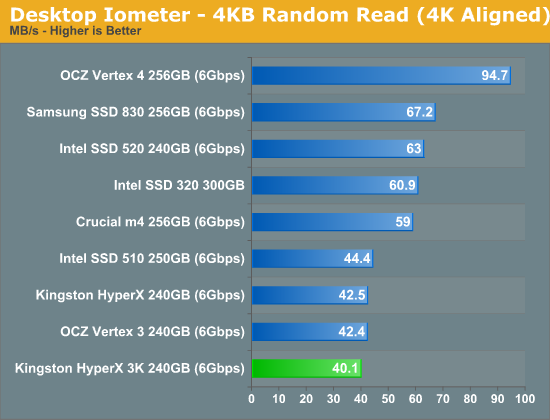
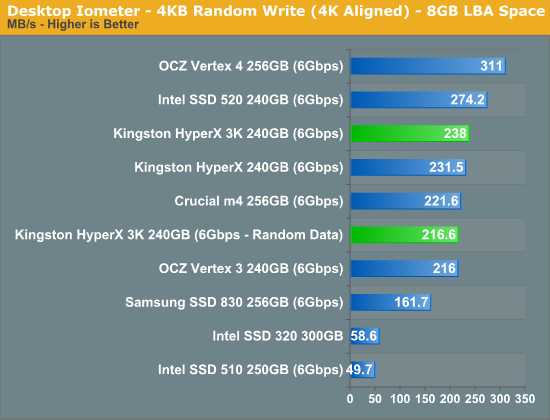
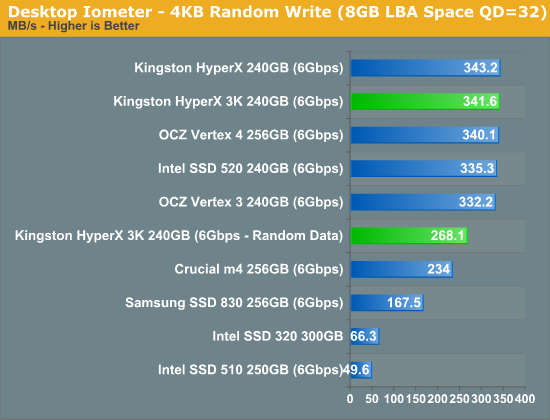








44 Comments
View All Comments
vandalizmo - Tuesday, April 10, 2012 - link
As far as I remember in US dot "." is decimal separator, not thousands separator, which makesTotal Estimated Lifespan 8.219 years 13.698 years 27.397 years 82.191 years
look pretty small. Or is it actually ~8, ~13, ~27, ~82 years?
Ryan Smith - Tuesday, April 10, 2012 - link
8 years, 13 years, etc is correct. A 1 write cycle a day, you'll go through 3000 cycles in a little over 8 years.Conficio - Tuesday, April 10, 2012 - link
You state there are software tools that come with the drive. What OS platforms do they support? Windows? Mac OS X? Linux? BDS?I'm tired of hardware that is only supported on Windows. And I grow tired of tests that do not even bother to mention where the software is actually available. I don't expect you to test all versions, although that would be much appreciated, but please give us the basic information.
On that page, I'd love to hear a comparison of the tool support for SSD drives on Linux as well as on Mac OS X. I think that would be worth an extra article with unique content. Fellow readers, am I alone in this desire?
Senti - Tuesday, April 10, 2012 - link
No you aren't alone. It's very frustrating that the ONLY platform supported for my OCZ Revodrive 3 is Win7. At least it also work in 2008R2. Tried 2003 - got blue screen.Coup27 - Tuesday, April 10, 2012 - link
I did read on the comments of the Plextor review that they are going to start paying more article attention to the toolboxes which are offered with the drives.Suprising to see that the next article after that comment also skips over the toolbox program with no further information or screenshots.
Kristian Vättö - Tuesday, April 10, 2012 - link
I can only talk on behalf of my reviews, remember that.Coup27 - Tuesday, April 10, 2012 - link
"i agree wholeheartedly - Samsung's toolbox is definitely the new gold standard here. I've been pushing folks behind the scenes to ramp up the quality of their options as well. I want to start paying more attention to it as it's a huge part of the user experience.Take care,
Anand"
Wasn't aimed at you Kristian, this was the comment I remember seeing. Would have been a perfect opportunity to see another toolbox beyond Intels and Samsungs.
MrSpadge - Tuesday, April 10, 2012 - link
Stating the manufacturers information on OS support is something the reviewer can and probably should do. However, with Linux and other exotic OSes this information may be short lived and as a interested customer one would probably have to dig for current information anyway.And support will always depend on the specific distribution.. then there will work-arounds / hacks to make it work elsewhere, which won't work for everyone. I hope you're not hoping to get this information from reviews ;)
Otherwise I pledge it should be on a separate page in the appendix called "linux support issues", which the rest of us can ignore.
Jaraxal - Tuesday, April 10, 2012 - link
I also do not see links for or entries in the drop down box for the last part of the review (conclusion, etc).MrSpadge - Tuesday, April 10, 2012 - link
Take a look at the 1st page, there's nothing more to say.